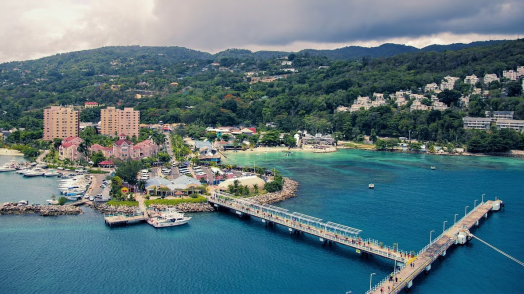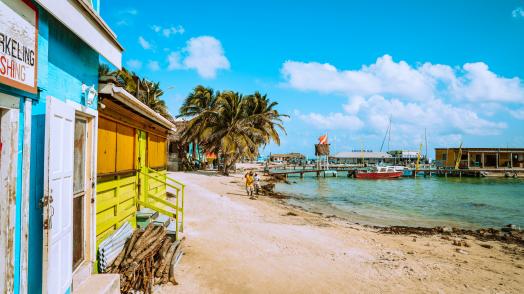Caribbean countries are highly exposed to natural hazards – both physically and financially. The EU Resilient Caribbean (EUReCa) Program contributes to reducing the impacts of disasters, including those related to climate change and epidemics, while increasing the resilience to external shocks in Caribbean countries.

Learn more about the program
Declining freshwater availability, rising sea levels, coastal erosion, and flooding are common throughout the region due to environmental degradation and climate change, which further exacerbates economic losses due to damage to critical infrastructure during disasters. Due to global warming, global climate models predict hurricanes will likely cause more intense rainfall and have an increased coastal flood risk due to higher storm surge caused by rising sea levels. Additionally, hurricanes that form are more likely to become intense. Moreover, many Caribbean countries face growing challenges associated with informal and formal settlements as well as public infrastructure built on land which is prone to hazards, and challenges related to the impact of climate change.
The impact and severity of disasters that follow a hazard event depend on the choices made over time by governments, the private sector, and others. Even though disaster risk reduction renders benefits four times the costs in terms of avoided and reduced loss, investment in Disaster Risk Management (DRM) has been very low in most countries and represents a tiny proportion of international development assistance. The majority of DRM related development financing remains for emergency response. This is because decision makers tend not to prioritize investment in resilience due to lack of immediate gains or benefits, or they also face competing priorities for social and economic development, which may be seen as more pressing than investing in resilience given limited resource. Additionally, institutional and governance challenges can also explain this trend However, due to their exposure and vulnerability to the impacts of climate change, adaptation is considered a priority for Caribbean countries, and has been advanced in developing National Adaptation Strategies/Plans. DRR/DRM has a direct link with their adaptation strategies and supporting DRR/DRM in the Caribbean should obviously be linked to the development and implementation of National Adaptation Strategies/Plans. Finally, while advances in science and technology have made it possible to forecast many hazards and disseminate warnings, countries should continually improve and update their understanding of the potential impact of complex, fast and slow-onset hazards to ensure risk-informed decision-making.
The EU Resilient Caribbean (EUReCa) Program is a partnership between the European Union (EU), the Global Facility for Disaster Reduction and Recovery (GFDRR) and the World Bank. The objective of the Program is to contributes to reducing the impacts of disasters, including those related to climate change and epidemics, while increasing the resilience to external shocks in Caribbean countries.
The Program builds on the success of previous cooperation involving the EU, GFDRR and the World through the ACP-EU Natural Disaster Risk Reduction Program, the Caribbean Regional Resilience Building Facility, and the Technical Assistance Program for Disaster Risk Financing and Insurance in Caribbean Overseas Countries and Territories, as well as the ongoing ACP-EU Disaster Risk Management program. These endeavors have ensured a coordinated approach to strengthening climate and disaster resilience in in the Caribbean region.
EUReCa beneficiary countries are: Antigua and Barbuda, Bahamas, Barbados, Belize, Dominica, Dominican Republic, Grenada, Guyana, Haiti, Jamaica, St Kitts and Nevis, St. Lucia, St. Vincent and the Grenadines, Suriname and Trinidad and Tobago.
The Program has three components:
Component 1: Technical Assistance and Financing to Mainstream Resilience
EUReCA can provide demand-driven technical assistance and financing to beneficiary countries to mainstream resilience into sectoral policies, strategies and investments.
This includes enhancing capacities of disaster risk management (DRM) practitioners and government counterparts in developing and implementing disaster and climate risk informed policies, plans, and investments, in critical areas such as public infrastructure, education and health facilities, transport infrastructure, urban resilience, nature-based solutions, flood mitigation, and coastal zone management, among others.
In these sectors, the programme can, inter alia:
- Build or strengthen capacity to understand risk, including how climate change may affect risk profiles (e.g.: hazard mapping, exposure modelling, vulnerability analysis, probabilistic risk models, and spatial data management, including geomatic and geodesy, as well as economic and non-economic analyses).
- Support to design and implement risk informed policies, as well as to identify investment projects and institutional reforms.
- Support to mobilize additional financing for resilience and recovery projects, including co-financing of DRM investment projects, and identifying opportunities for investments under the European Fund for Sustainable Development Plus (EFSD+) and other financing institutions.
- Co-finance resilient investments to reduce infrastructure vulnerability and foster innovative DRM approaches in key sectors
Component 2: Technical Assistance and Financing for Emergency Preparedness and Response
EUReCA can provide demand-driven technical assistance and financing to beneficiary countries to improve disaster preparedness and response measures for governments, national and regional institutions, and communities to better prepare, respond, sustain and recover from disasters.
The programme can, inter alia:
- Strengthen capacity in emergency preparedness, response and recovery at the regional (notably through CDEMA), sub-regional and national levels, including social protection policies, multi-hazard early warning systems, information management, and emergency management facilities.
- Support to develop response plans, forecast based and contingency plans, standard operating procedures (SOPs) and business continuity plans for governments, local authorities and the private sector in key economic sectors.
- Support to design, and implement policies, investment projects and institutional reforms in the field of emergency preparedness and response and forecast-based actions.
- Co-finance investments to strengthen emergency preparedness and response, including infrastructures and to support risk-informed reconstruction and development.
Component 3: Technical Assistance and Financing to Strengthen Financial Protection
EUReCA can provide demand-driven technical assistance and financing to beneficiary countries, to enhance capacities of countries in understanding, developing and using the most adequate disaster risk financing instruments and strategies.
The programme can, inter alia:
- Build capacity to understand disaster risk financing and insurance solutions, including fiscal management, designing resilient budgeting frameworks and forecast impact based tools.
- Support to elaborate and implement comprehensive disaster risk financing strategies, including insurance solutions, in coordination with the Caribbean Development Bank (CDB) and others.
- Support the implementation of sector-specific disaster risk financing solutions in priority sectors, like housing, agriculture, infrastructure, among others.
- Co-finance development policy financing (e.g.: Catastrophic Deferred Drawdown Option (Cat DDO)).
The EUReCa Program is funded by the European Union and managed by the GFDRR. Activities are implemented by World Bank teams and beneficiary countries, in close collaboration with EU Delegations to Caribbean countries and to regional and sub-regional organizations, particularly with the EU Delegation to Barbados, Eastern Caribbean States, the OECS and CARICOM/CARIFORUM.
The EUReCa program collaborates and coordinate activities at the national and regional levels with relevant partners in the Caribbean region, particularly with the Caribbean Disaster Emergency Management Agency (CDEMA), the Caribbean Development Bank (particularly in the frame of the CaRe Program), multilateral development banks such as IADB and EIB, bilateral agencies such as (AECID, AFD, GIZ), bilateral donors (including Canada, USAID, FCDO), the EUROCLIMA program and UN agencies.
Component 1
- Belize – Blue Cities and Beyond Project
- Saint Lucia – Enhancing Urban Flood Resilience in Castries and Anse La Raye with Nature-Based Solutions
Component 2
Component 3
- Belize – Enhancing Financial Resilience for Improved Disaster Risk Management
- Saint Lucia – Strengthening Financial Protection
- Saint Vincent and the Grenadines – Strengthening Financial Resilience
- Barbados - Technical Assistance to Strengthen Financial Protection
November 2024: Video - The European Union, World Bank and GFDRR support to building resilience in the Caribbean


